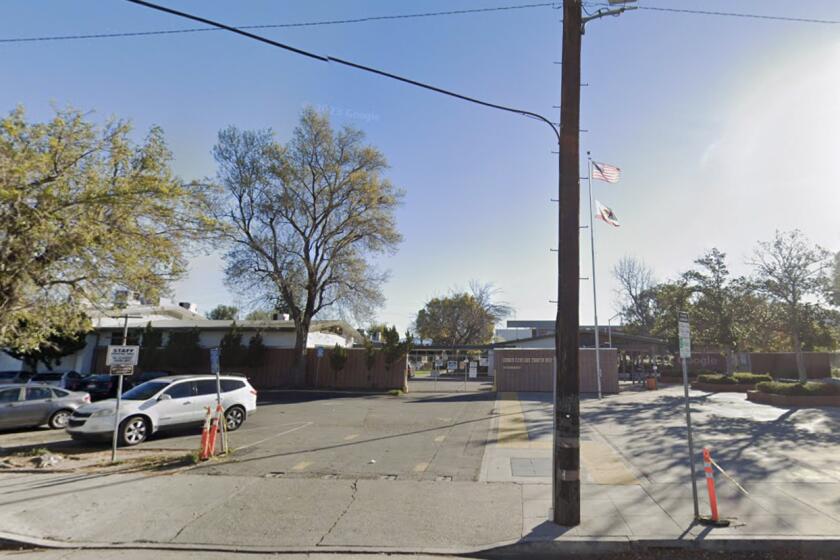Court May Have Slain Black Dragon
The Black Dragon, the once-storied gang that for two decades preyed on Southern California’s bourgeoning Chinese immigrant community, suffered an inglorious downfall Monday in a Burbank courtroom.
The three reputed leaders of the gang were sentenced to more than 24 years in prison for attempted murder. Authorities contend that the court action leaves the Black Dragon, once considered one of California’s most powerful Asian gangs, rudderless and with a dwindling membership.
To authorities and gang experts, it’s something of an end of an era.
Asian street gangs, a heavy presence in Los Angeles’ Chinatown as well as parts of the San Gabriel Valley over the last two decades, were known for extorting business owners and shooting at each other. But recently they have seen their influence and power fade.
The Wah Ching, the other major Chinese gang in California, also based in L.A., was weakened three years ago when its leaders were arrested and later convicted as part of a federal investigation.
Both that probe and the Black Dragon investigation used informants from inside the gangs. Investigators believe they were able to infiltrate the organizations because the gangs are less disciplined now than in the past.
“Back in the late 1980s and through the ‘90s, you’d have guys in the leadership from Wah Ching and Black Dragon that seemed to be more organized,” said Det. R. Lee, a Monterey Park police detective who has tracked Asian gangs for years. “I don’t see the discipline that was instilled in the membership back in the day. If you were a leader, you were able to control your underlings. I don’t think they have that control any more.”
Lee said organized crime remains a problem in the Chinese community. But in recent years, it has centered more on more profitable counterfeiting, identity theft and credit-card fraud than prostitution, extortion and other enterprises favored by traditional street gangs.
The Black Dragons were formed in 1984 mainly by teenagers in Lincoln Heights, a working-class enclave for ethnic Chinese who had fled political turmoil in Vietnam. Unlike the Wah Ching, which had its roots in Hong Kong, the Black Dragons were homegrown.
What started as a way to protect themselves from rival ethnic gangs in school turned into a crime organization that specialized in home-invasion robberies and extortion, said FBI Agent Kerry Smith, who worked on the latest case.
At its peak, the gang had about 100 core members, officials said.
The Black Dragon, authorities alleged, would regularly target brothels run by illegal mainland Chinese immigrants because the victims were less likely to report the crimes for fear of being deported. Some of the brothels were run on a day-to-day basis by the gang while others had to pay protection money in the thousands each month, according to authorities. The gang also took part in home invasions and other crimes, officials said.
The Black Dragon gained a measure of notoriety in the early 1990s as newspaper and TV reports cited the gang as part of the rise in Asian organized crime across Southern California. Members went by names like “Knockout” and “Ruthless.”
Investigators said they lacked the evidence to prosecute suspects -- largely because witnesses within the Chinese community were too intimidated to testify.
In hopes of finding witnesses to step forward after a series of arrests in 1990, the Los Angeles Police Department held a news conference announcing it had arrested 18 suspected Black Dragon members on suspicion of kidnappings and holdups at a pair of hair salons. But not enough witnesses stepped forward, and 13 of the suspects were released because of insufficient evidence.
A decade later, authorities said they were finding signs that the gang was losing strength.
Lee, the Monterey Park detective, attributed this in part to assimilation: Some new members didn’t have the same level of loyalty earlier immigrants afforded their leaders, who are known as “dai go” in Cantonese.
The FBI, working with local law enforcement agencies, began in 2000 to try to penetrate the organization. Officials eventually found a gang member who served as an informant and became the key prosecution witness in court.
In the end, the three Black Dragon leaders -- Khoanh Lam, 37, Minh Thang Tran, 52, and Cham Hoang, 23, -- were convicted not of extortion or racketeering but of an attempt to murder two of their own.
The informant testified that Lam and Tran ordered the slaying of two fellow gang members they believed were pocketing extortion money from a brothel. Hoang, the informant said, attempted to carry out the order.
Hoang cornered Thanh Ho and Ving Liu in the garage of a Rosemead brothel in September 2001, police said. Liu was stabbed 13 times and Ho once. Both fled the scene and survived, said May Chung, the Los Angeles County deputy district attorney assigned to the case.
The three Black Dragons were arrested in 2003.
Lam, Tran and Hoang were convicted on four counts each, two for attempted murder and two for conspiracy to murder. Each defendant was sentenced to 24 years and eight months in jail. None displayed emotion when the sentences were read to them through a Cantonese interpreter.
Defense attorneys tried to lessen the sentences by arguing that their clients were not nearly as dangerous as alleged and did not have the sophistication to lead the Black Dragon.
Most of the violence, they said, was committed upon their own gang members.
“My client was a loser,” said Lam’s attorney, Jonathan Mandel, adding that his client was a drug addict. “He was kind of comical. He drove a beat-up car and whatever money he made he’d just put up his nose. His family had to pay all his legal fees. This gang was pretty toothless. It was more young testosterone-driven rebels running around using Black Dragon as their name.”
Mandel disagrees with the prosecutor’s assertions that Lam was one of the gang’s founders and its top leader. He said Lam was so inept that he once left a threat of violence against a rival on an answering machine -- a misstep that savvier gang leaders would avoid because of the potential for investigators to locate the recording.
Tran’s lawyer, Donald Welch, said his client lived a seemingly normal life as a bail bondsman and has three children.
“He was not extravagant,” Welch said. “It’s not like what you hear about the Mafia, with riches beyond belief from drug sales.”
Chung, the prosecutor, said the defendants’ sophistication was not an issue and that any association with gang crime warranted the judge’s decision to enhance the sentences by 12 years whether they were “successful or unsuccessful” as a gang.
Authorities estimate that the Black Dragon’s core membership is less than 30. Twenty other members were taken in during the 2003 sweep; half of them have since been convicted and sentenced, prosecutors said.
Smith and Lee agreed with the FBI that the Black Dragons are suffering with their leadership behind bars. In a sign of this weakness, Lee said he had received calls from some of the illegal brothel operators who cooperated with investigators. He said they thanked him for taking the gang members off the streets.
But Lee is more pessimistic than other law enforcement officials about the future of Asian street gangs in the region.
“It’s not going to be long before someone sees an opening and replaces the Black Dragon.”
More to Read
Start your day right
Sign up for Essential California for news, features and recommendations from the L.A. Times and beyond in your inbox six days a week.
You may occasionally receive promotional content from the Los Angeles Times.







